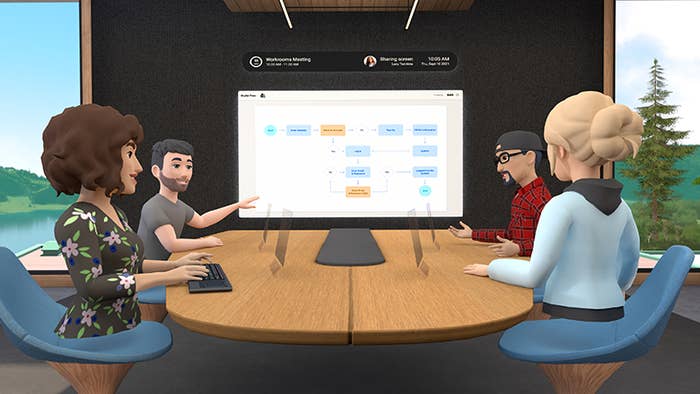
Facebook on Thursday offered a first glimpse at the “metaverse” CEO Mark Zuckerberg has recently been touting as "the successor to the mobile internet" and the future of his now–$354 billion company. He's described it as “an embodied internet that you’re inside of rather than just looking at,” which is evidently a fancy euphemism for attending a virtual work meeting via Facebook’s $299-plus Oculus virtual reality headset with a bunch of colleagues.
This is the bloody cutting edge, the vanguard of the fast-approaching next phase of our digital lives, a real-world manifestation of techno-optimism.
And it’s...work meetings.
.@GayleKing and Mark Zuckerberg conduct their first-ever virtual reality interview in Facebook’s new "Horizon Workrooms," a VR app that allows coworkers to interact in virtual offices. https://t.co/aVCtQu2pJi
This raises two grim possibilities. The first is the sad realization that science fiction icon Neal Stephenson’s metaverse — a collision of the physical and virtual in a shared online space — is a sad little office veal-penned in by floating whiteboards. The metaverse is the officeverse, and office work is boring. Meetings are boring. A large corpus of popular art is devoted to this concept.
The second is that like so many innovations touted as magnificent, world-changing shifts, this “embodied internet” that Zuckerberg is peddling is more of a sad-trombone “neat” than a Jobsian “BOOM.” We were promised flying cars and a VR whale jumping out of a basketball court. What we got is just another way to attend the work meetings we’re already sick of attending.
It’s “cool,” it looks pretty fun, I bet it’s nice to use. Is it life-changing? Mind-blowing? I don’t know. “A different kind of productivity experience” is not the first thing that comes to mind when I think of “metaverse.”
Earlier this spring Facebook revealed a wearable wrist device and glasses that could decipher neuron impulses from your brain to your hand. This was some very cool sci-fi stuff! We want the full experience! I want Facebook to steal my DNA and do something actually fucked up and weird and bad! Clone my ass, Zuck! Send my roboclones to fight in a space war against the Boston Dynamics dog robots while I bathe in a pod of goo! I want THAT. I don’t want more work meetings. No one wants more meetings. Please, sometimes just a phone call works.
imagine looking at the humble zoom meeting and thinking that what it really needs is expensive hardware, a third party with an egregiously poor track record on privacy and data, and a soupçon of nausea
V funny to me that everyone is like “we have zoom fatigue!” and Facebook was like “ok strap this computer to your face and step into the metaverse, baby!”
Andrew Bosworth, AR/VR executive at Facebook and leader of the new “metaverse” team, told the Verge, “I think it might be the most intense VR application that exists, in terms of how much we’re trying to put every bell and whistle from the headset into the experience you’re using.” There’s just something sad about the most ambitious and “intense” VR experience being a slightly better way to discuss the Q2 TPS reports.
A common criticism of Facebook’s forays into new technologies is the company’s shoddy track record on privacy. If we can’t trust Facebook with social media profiles used mainly for wishing high school friends happy birthday, how can we trust it not to abuse the smart cameras we install in our homes, or the headsets we strap to our faces? If the idea of Facebook processing video of your conversations with your family makes you squeamish, the idea of it processing work meetings where confidential or proprietary information might be discussed should give you pause.
But it’s possible there’s something that should fill us with even more dread and antipathy: What if Facebook’s “embodied internet,” its most invasive technology to date, establishing itself as the virtual reality intermediary for our everyday interactions, is just, well, kind of boring?
